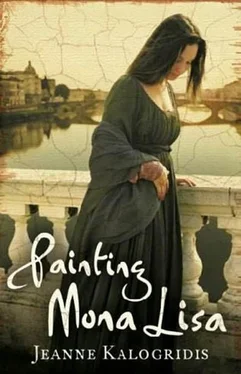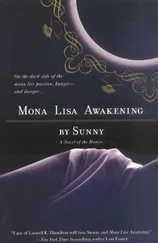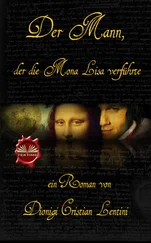“Why would you not enter the fire?”
“Sodomite!”
“Heretic!”
“Liar!”
The wives grew frightened; they hurried to the ringhiera , to their husbands’ sides. I went to stand beside Francesco. Savonarola was nearby, quite dry, but trembling as though the rain had soaked him through.
“I cannot leave without an escort! The Franciscans have turned the people against me!”
“I will arrange for one,” Valori said, and disappeared inside the palazzo. Francesco sent a page out into the piazza to summon Claudio.
While we were riding home, the deluge let up as quickly as it had come. Francesco looked out the window and let go an odd, catching sigh.
“It is over.”
W e returned to the palazzo and Francesco did not venture out again that day. He ordered the gate closed and locked, and set stablehands armed with swords to guard it; then he went into his study and did not come out, even for supper.
My father failed to come to supper as well, which concerned me. I had not seen him in several days, but Francesco had forbidden anyone to leave the palazzo that night. Our street, fortunately, was quiet, but I could see the glow of torchlight coming from the west, where the monastery and church of San Marco lay.
Earlier that morning, Isabella had been nervously waiting with the women of San Marco-out of curiosity, not faith-to hear the outcome of the Trial by Fire. When Savonarola arrived, she said, he told the women that the Franciscans had delayed for so long that they angered God, Who sent the storm. The women were skeptical-even more so when their husbands arrived, furious with their prophet. Isabella reported that the parishioners had actually begun to battle the monks, and so she had left out of fright.
The next day was Palm Sunday. Francesco did not attend church, but chose again to remain home and forbade the rest of us to leave. This day, however, he had visitors, all at different times. The head of the piagnoni , Francesco Valori, called early in the morning and spoke privately to my husband in his study; he came and left wearing the stricken expression of a man who had discovered all his gold turned to sand. The second caller was a young messenger with a letter; my husband insisted on taking delivery of it personally.
The third caller was a prominent member of the Arrabbiati , one Benedetto de’ Nerli. He arrived at night, after supper, and apologized for the lateness of the hour, but said that he had pressing need to speak to Ser Francesco.
My husband received him in our great sitting room. I had heard the disturbance and came down; although I was not invited to sit with the men, I hovered near the open door and listened. Ser Benedetto had a deep, resonant voice and spoke very clearly, for which I was grateful.
“I come bearing bad news,” Ser Benedetto began.
Francesco’s voice was faint, slightly sarcastic. “I can’t imagine how the situation could grow worse.”
Ser Benedetto ignored the comment and continued, steady and forthcoming. “The piagnoni have lost their leader. Francesco Valori was killed tonight.”
There came a silence, as my husband digested this tragedy. “How did it happen?”
“He was attending vespers at San Marco. A group of roughs disrupted the service and threatened to burn his house. It grew ugly; they took him by force, but he managed to escape. When he got to his house, he hid in a cupboard; the group followed and shot his wife in the forehead with a crossbow. Then they found Valori and started to drag him to the Signoria-”
“A foolish course, if they wanted to harm him,” my husband interjected. “He would find safety there.”
Ser Benedetto’s tone turned abruptly cool. “Perhaps not.” He paused to let his innuendo sink in, then continued. “On the way to the Signoria, they came across Vicenzo Ridolfi and Simone Tornabuoni…”
I knew the names. These men were relatives of two of the beheaded men, Lorenzo Tornabuoni and Niccolò Ridolfi.
“They can hardly be blamed for wanting revenge on Valori, who spearheaded the campaign to behead their loved ones. They had taken to the streets, as have so many others who hope for Savonarola’s arrest. Tornabuoni wielded a pruning hook…”
I closed my eyes.
“… and split Valori’s skull in two, while Ridolfi cried, ‘You will never govern again!’ As far as I know, Valori’s body is still lying out in the street.”
“Why are you telling me this?” my husband asked. His tone was not cold or defensive, as I would have expected; there was a hint of receptiveness in it.
“For the current session, as you know, the Signoria is split evenly between your party and mine. If it remains equally divided, there will be no legal way to resolve the question of Savonarola. It will be decided in the streets, with bloodshed, and all the citizens suffering.
“But if-”
My husband interrupted. “If just one piagnone prior were to change his loyalties and side with the Arrabbiati …”
“Precisely. Justice could be administered swiftly, and many lives spared.”
“Ser Benedetto,” my husband said, with the same warm graciousness he extended to any honored guest. “I shall think on what you have said. And I shall give you my answer in the morning, when the Signoria convenes.”
“Let it be no later,” Ser Benedetto said, and I heard the warning in it.
I heard the warning, and was happy. I wanted Fra Girolamo to burn. Even more, I wanted Domenico to burn with him.
On Monday morning, my husband told me to have the servants prepare the house for a prestigious guest, who would be coming to stay with us for a few weeks; then he left for the Signoria. Even though the streets were calmer, thanks to the small battalions of neighborhood troops maintaining the peace, he did not travel alone: He requested that Claudio drive him, and he had two armed men accompany him in the carriage.
I was stranded at home, without a driver. Zalumma and I could always ride on horseback together, if we desperately needed to leave the house-but it was always safer to have a male companion, and that was under normal circumstances, not uncertain times like these. And every servant that might act as chaperone was far too busy obeying Francesco’s orders to ready the palazzo for our guest.
I chafed to see my father. I decided that as soon as Francesco returned, I would insist on going to visit my father, to be sure that he was well. I envisioned the conversation with Francesco in my mind: his refusal, saying it was not safe, and my insistence, saying that I would have Claudio and the two armed men to protect me.
Zalumma and I fetched Matteo from the nursery and took him down to the garden, since the day was pleasant. We chased him and giggled, and I clasped his hands and wrists and whirled him round in a circle until his feet lifted off the ground.
I intended to exhaust us both. I knew of no other way to brighten my thoughts. But for the first time, Matteo tired first. Head lolling, he slept in my arms-almost too heavy now to hold-and I walked beside Zalumma past the rosebushes.
Zalumma kept her voice low. “What do you think will happen to Savonarola?”
“I think that Francesco will join the Arrabbiati ,” I said, “and that Savonarola will die. Be burned at the stake, just like Mother said. She was right about the five headless men, don’t you remember?”
“I remember.” Zalumma gazed at a distant olive grove on a hill, at some secret memory. “She was right about many things.” Her tone hardened. “I’ll be glad when he dies.”
“It won’t change anything,” I said.
She snapped her head about to look at me in disbelief. “What do you mean? It will change everything !”
Читать дальше
Конец ознакомительного отрывка
Купить книгу












